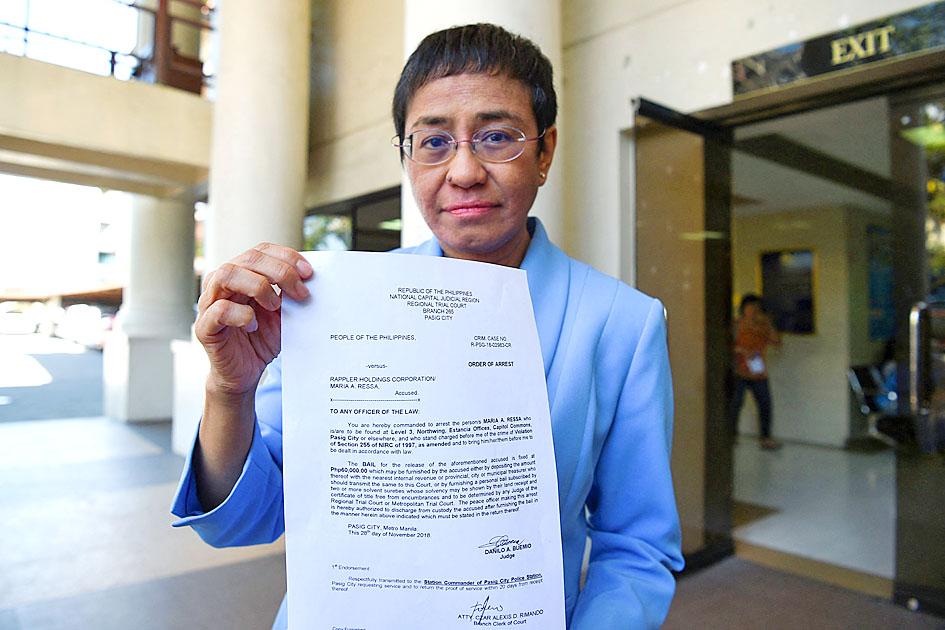The Nobel Peace Prize was yesterday awarded to journalists Maria Ressa of the Philippines and Dmitry Muratov of Russia for their fight for freedom of expression in their countries.
The pair were honored “for their efforts to safeguard freedom of expression, which is a precondition for democracy and lasting peace,” Norwegian Nobel Committee chairwoman Berit Reiss-Andersen said.
“They are representatives of all journalists who stand up for this ideal in a world in which democracy and freedom of the press face increasingly adverse conditions,” she said.

Photo: AFP
Ressa, 58, told Norwegian TV2 that she was “shocked” and “emotional” to receive the honor, which she said would give her and her colleagues “tremendous energy to continue the fight.”
In 2012, Ressa cofounded Rappler, a digital media company for investigative journalism, which she still heads, while Muratov is one of the founders of the independent newspaper Novaya Gazeta.
Rappler has “focused critical attention on the [Philippine President Rodrigo] Duterte regime’s controversial, murderous anti-drug campaign,” Reiss-Andersen said. “The number of deaths is so high that the campaign resembles a war waged against the country’s own population.”
Ressa and Rappler have also documented how social media is being used to spread fake news, harass opponents and manipulate public discourse.
Ressa, a former CNN correspondent who also holds US citizenship, is currently on bail pending an appeal against a conviction in a cyberlibel case last year, for which she faces up to six years in prison.
Muratov, 59, has defended freedom of speech in Russia for decades, under increasingly challenging conditions.
In 1993, he was a founder of the Novaya Gazeta, which has a “fundamentally critical attitude toward power,” the committee said.
He has been its editor-in-chief since 1995.
Novaya Gazeta’s opponents have responded with harassment, threats, violence and murder.
Since the newspaper’s start, six of its journalists have been killed, including Anna Politkovskaya, who wrote revealing articles on the Second Chechen War.
“Despite the killings and threats, editor-in-chief Muratov has refused to abandon the newspaper’s independent policy,” Reiss-Andersen said. “He has consistently defended the right of journalists to write anything they want about whatever they want, as long as they comply with the professional and ethical standards of journalism.”
Free, independent and fact-based journalism helps protect against abuse of power, lies and war propaganda, Reiss-Andersen said.
“Without freedom of expression and freedom of the press, it will be difficult to successfully promote fraternity between nations, disarmament and a better world order to succeed in our time,” Reiss-Andersen said.
Media watchdogs had been tipped as contenders for the prestigious prize ahead of the announcement.
The prize — consisting of a diploma, a gold medal and a cheque for 10 million kronor (US$1.17 million) — is traditionally awarded in Oslo on Dec. 10, the anniversary of the 1896 death of prize creator Alfred Nobel.

The CIA has a message for Chinese government officials worried about their place in Chinese President Xi Jinping’s (習近平) government: Come work with us. The agency released two Mandarin-language videos on social media on Thursday inviting disgruntled officials to contact the CIA. The recruitment videos posted on YouTube and X racked up more than 5 million views combined in their first day. The outreach comes as CIA Director John Ratcliffe has vowed to boost the agency’s use of intelligence from human sources and its focus on China, which has recently targeted US officials with its own espionage operations. The videos are “aimed at

STEADFAST FRIEND: The bills encourage increased Taiwan-US engagement and address China’s distortion of UN Resolution 2758 to isolate Taiwan internationally The Presidential Office yesterday thanked the US House of Representatives for unanimously passing two Taiwan-related bills highlighting its solid support for Taiwan’s democracy and global participation, and for deepening bilateral relations. One of the bills, the Taiwan Assurance Implementation Act, requires the US Department of State to periodically review its guidelines for engagement with Taiwan, and report to the US Congress on the guidelines and plans to lift self-imposed limitations on US-Taiwan engagement. The other bill is the Taiwan International Solidarity Act, which clarifies that UN Resolution 2758 does not address the issue of the representation of Taiwan or its people in

US Indo-Pacific Commander Admiral Samuel Paparo on Friday expressed concern over the rate at which China is diversifying its military exercises, the Financial Times (FT) reported on Saturday. “The rates of change on the depth and breadth of their exercises is the one non-linear effect that I’ve seen in the last year that wakes me up at night or keeps me up at night,” Paparo was quoted by FT as saying while attending the annual Sedona Forum at the McCain Institute in Arizona. Paparo also expressed concern over the speed with which China was expanding its military. While the US

SHIFT: Taiwan’s better-than-expected first-quarter GDP and signs of weakness in the US have driven global capital back to emerging markets, the central bank head said The central bank yesterday blamed market speculation for the steep rise in the local currency, and urged exporters and financial institutions to stay calm and stop panic sell-offs to avoid hurting their own profitability. The nation’s top monetary policymaker said that it would step in, if necessary, to maintain order and stability in the foreign exchange market. The remarks came as the NT dollar yesterday closed up NT$0.919 to NT$30.145 against the US dollar in Taipei trading, after rising as high as NT$29.59 in intraday trading. The local currency has surged 5.85 percent against the greenback over the past two sessions, central